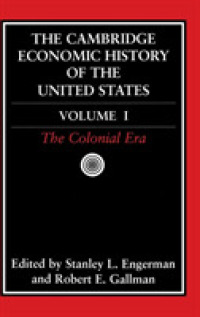- ホーム
- > 洋書
- > ドイツ書
- > Humanities, Arts & Music
- > Linguistics
- > german linguistics
Full Description
This study focuses on the five most prominent Swiss writers of the last thirty-five years whose work features ecological crisis. It is an analysis of five narratologically divergent styles, ranging from the eco-parables of Franz Hohler to the hermeneutically defiant work of Gertrud Leutenegger. Between these poles, the author also explores works by Walther Kauer, Max Frisch and Beat Sterchi. Previously unpublished material from interviews with three of the authors is included.
These writers are not only the most widely read and respected ecologically committed authors in Switzerland but also present a wide range of approaches to ecological problems in terms of both form and content. The study's purpose is not merely to provide a survey of fictional, ecological discourse in Switzerland but to analyse the literary strategies used: how well do the ways the authors tell their tales support their critical thrust? This question is posed within the proposition of the theoretical framework of an 'ecological voice'.
Contents
Contents: Franz Hohler's Eco-Parables - Walther Kauer's Spätholz: Capitalism, Fascism and Subsistence Farming - Max Frisch's Der Mensch erscheint im Holozän: Ecological Eschatology - Beat Sterchi's Blösch: A Bovine Plea for Biocentrism - Gertrud Leutenegger's Metanoic Narratives.







